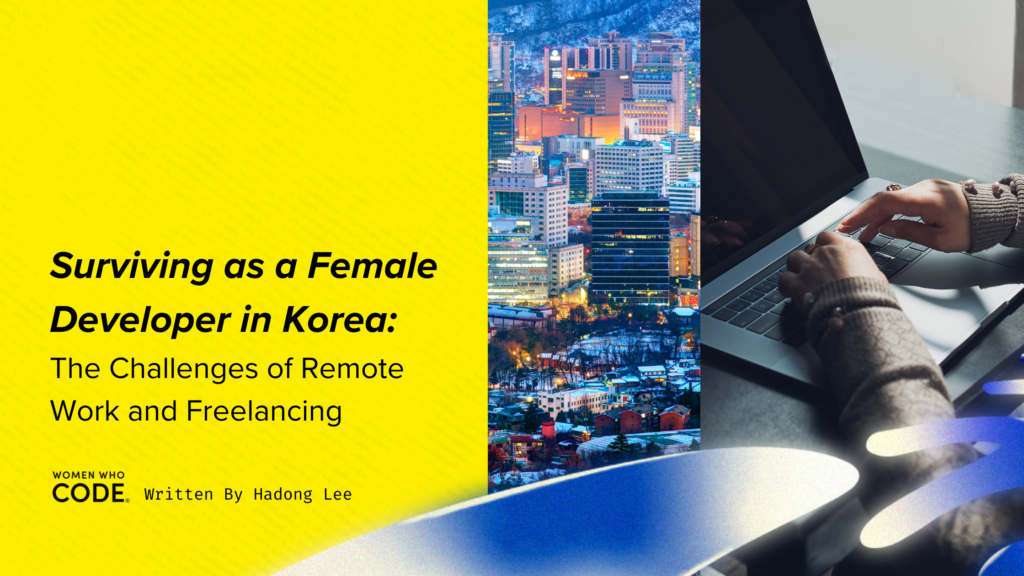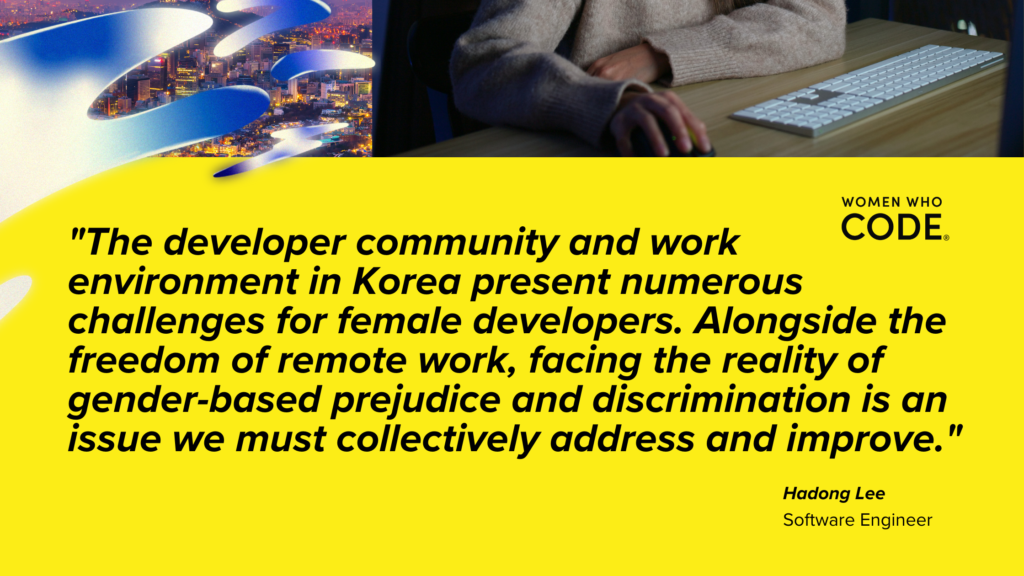Surviving as a Female Developer in Korea: The Challenges of Remote Work and Freelancing
Written by Hadong Lee

As a female developer navigating the tech landscape in Korea, my journey has been marked by unexpected twists and challenges, especially in the wake of the COVID-19 pandemic. From transitioning to remote work to venturing into freelancing to confronting gender discrimination in the workplace, each experience has shaped my perspective as a female engineer in Korea. Through my story, I aim to shed light on the realities faced by female developers in Korea, spark conversation, and foster empathy within our community of diverse technologists.
1. The Challenge of Remote Work
In Korea, companies that allow overseas remote work are exceedingly rare. In most cases, only short-term home office work is feasible, and working across continents is almost impossible. In trying to achieve the freedom of remote work as a freelancer, I had to give up many benefits regular employees enjoy. This decision was partly influenced by a personal situation—my family moving abroad for educational purposes, which unexpectedly thrust me into considering a more nomadic work lifestyle. This shift not only aimed at maintaining my professional life but also exploring the possibility of joining my family overseas. Fortuitously, this transition into freelancing has allowed me to work within this new framework despite the sacrifices involved.
2. The Challenge of the Work Environment
The success of a project is not only dependent on engineering skills; effective communication with clients and the coordination of work also play crucial roles. As a remote worker, I’ve felt isolated, finding that challenges in communication have often posed greater obstacles than the work itself. While managing time differences is feasible with proper scheduling, remote work requires active engagement from all team members to prevent passive feedback and communication avoidance, which can complicate the work environment for various reasons.
Initially, I believed that these communication issues primarily impacted client relations rather than teamwork. However, it’s clear that both aspects are crucial and interlinked. Being unable to communicate directly with clients and constantly going through middle management for discussions, coupled with limited interaction with team members, often led to urgent issues arising due to tight schedules. This resulted in several days of overtime work, causing fatigue and raising questions about work hour fairness. Although we had set work hours according to time zones, the lack of a core work time due to all developers working remotely continued to delay tasks. The role of the Project Manager (PM) proved to be vital in addressing these challenges. We organized specific meetings for work distribution planning, where tasks were finely segmented and fairly allocated among team members according to issues. This solution came through various trials and errors.
In this journey, it became evident that navigating the complexities of remote work goes beyond just managing schedules; it involves fostering a culture of open communication and effective team collaboration to ensure the timely and successful completion of projects.

3. The Challenge of Gender
Experiencing workplace gender discrimination and prejudice presents another difficulty for female developers. Negative feedback and sexist remarks from colleagues make the work environment even more challenging. Asking questions can lead to being ignored. Having a casual walk home with a colleague can easily be misinterpreted as a date, and rejection can sometimes lead to retaliation in work matters. Female managers do not always help as they might adapt to the work environment by making sexist remarks just like their male counterparts. This problem persists in the freelance market, driving many female developers to move to foreign multinational corporations seeking more inclusive and supportive work environments.
To illustrate, I encountered a situation where a colleague harbored personal grievances against me and spread negative comments during an offline meeting I wasn’t part of. Upon hearing this from a middle manager, I proactively sought my immediate supervisor’s direct feedback on my work. After confirming that there were no significant issues with my performance, I addressed the matter in a team meeting. I emphasized the importance of direct communication and public discussion for any work-related improvements, advocating for a more open and respectful dialogue. This incident not only highlights the challenges of navigating gender discrimination but also underscores the importance of assertiveness and clear communication in overcoming workplace prejudices.
Adding to this, the inability to even discuss gender diversity is profoundly disheartening. In Korea, binary perception of gender is still prevalent, acknowledging only men and women, and non-heteronormative orientations are considered to be social taboos. This leads to a complete lack of recognition and discussion about gender diversity, further exacerbating the challenges faced by those who do not conform to traditional gender norms that make the tech industry- and broader workplace environments — less inclusive and supportive for everyone.
The developer community and work environment in Korea present numerous challenges for female developers. Alongside the freedom of remote work, facing the reality of gender-based prejudice and discrimination is an issue we must collectively address and improve. By sharing our experiences and advocating for change, we can pave the way for a more inclusive and supportive work environment where every individual, regardless of gender, can thrive. I invite you to join me on this journey as we strive to break down barriers and build a brighter future for women in tech.
Learn more and connect with Hadong Lee via LinkedIn.